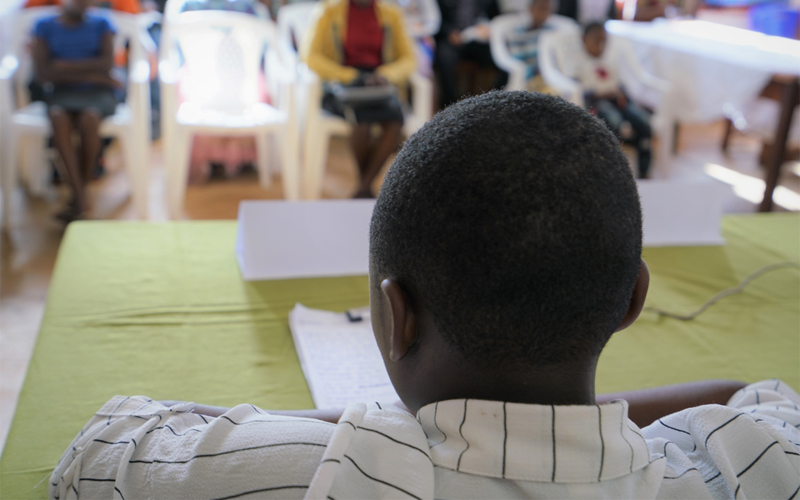At the G20 this weekend, Prime Minister Trudeau and other world leaders will be talking about the best ways to tackle the global pandemic. So, it would be easy to overlook another item on their agenda that needs critical attention and action: empowering women, boys and girls.
The G20 starts on November 21st but it should really have started one day early on Universal Children’s Day. Why? Even though children and youth represent half the people living in the most dangerous places, like slums and refugee camps, they have almost no say in the decisions that impact them the most.
And it’s the most vulnerable children who are paying a huge price during the pandemic from a slew of secondary impacts.
A new World Vision global survey of children reveals that 81% of them have experienced or seen an increase in violence since the crisis began. This comes after a report that up to
85 million children (about two and half times the population of Canada) worldwide are at risk of physical, sexual and/or emotional violence as a result of COVID-19 quarantines and restrictions. This sets back decades of progress on children’s rights.
When considering these sobering statistics, “Robert” comes to mind, a 17-year-old youth I met in Eastern
Democratic Republic of Congo this past October. At the time, Robert and most of his classmates said they’d been directly impacted in recent attacks by armed groups and 30 students had been killed.
 17-year-old Robert has a story that needs to be heard, and a lived experience that should inform the policy and program decisions made by adults in positions of power like those at the G20 Summit. Photo: Brett Tarver
If Robert was at the G20 virtual table, he would tell them what he told me:
“There has been a lot of fighting and massacres. Militias have been coming to our homes around here to kill us --- or to kidnap us and force us to join them.
17-year-old Robert has a story that needs to be heard, and a lived experience that should inform the policy and program decisions made by adults in positions of power like those at the G20 Summit. Photo: Brett Tarver
If Robert was at the G20 virtual table, he would tell them what he told me:
“There has been a lot of fighting and massacres. Militias have been coming to our homes around here to kill us --- or to kidnap us and force us to join them.
Earlier this year, I was at home with my family when we heard gunshots in the distance. My sister and I escaped on foot, but my parents decided to stay home. As we came to a river crossing there were a lot of people crossing the water to escape the fighting. I was helping some young children cross the river when the militia appeared, and they began shooting everyone. One of the girls I was crossing the river with was killed as I held her hand.
I ran and dove into a pool of water to hide, but one of them saw me and started shooting at me. I was shot five times. He came down to where I lay and poked me. But I lay totally still, pretending to be dead.
Even after they left, I still lay there in the water and didn’t move. I was very cold and thirsty, but I waited for another five hours until it was dark. I called out to my sister who was hiding nearby, and she came and bandaged my wounds.”
Robert was back in school when I met him but was still recovering from his wounds. The message he shared was that he needed to be protected and stay in school.
World leaders need to hear Robert and listen to youth leaders about actionable solutions that will improve their lives. For those who think they don’t have what it takes, think again. Programs that empower children instead of treating them like passive victims, have demonstrated that
they create hidden heroes in times of need.
Anne-Marie Connor, National Director of World Vision in Robert’s country, the DRC, has successfully implemented this approach through a network of child parliaments.
 A gathering of child parliamentarians in Beni, Democratic Republic of Congo. Photo: Brett Tarver
A gathering of child parliamentarians in Beni, Democratic Republic of Congo. Photo: Brett Tarver
“Child Parliaments are one of the best ways we can learn about the real issues facing children, and how their political, social, psychological, health, education, legal or even cultural rights are being denied,” she says. “It gives them a chance to openly speak about their needs during crises like Ebola and COVID-19 that make existing challenges like violent conflict and hunger worse. These opportunities give them a chance to propose ways to tackle their issues, as they hone their leadership skills.”
It’s time to help fast track the leaders of tomorrow because their perspective, and participation, is crucial as we work together to respond to COVID-19 and build children’s lives back better in its aftermath.
The G20 needs to make stronger funding commitments for health, education and other services that protect children from harm during the pandemic that are guided by children’s voices.
So far, World Vision has reached 24 million children with education, child protection and food and livelihood support, as part of its
$350 million USD response to the coronavirus pandemic.
Learn more about how you can help.